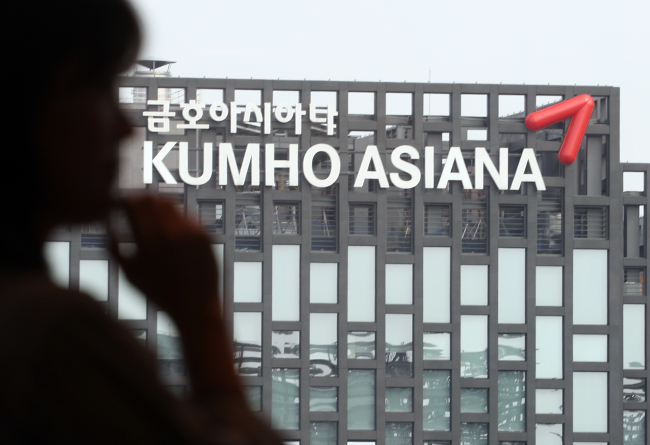Kumho Asiana Group, South Korea’s 28th-largest conglomerate, stands on the brink of selling off Asiana Airlines -- the group’s flagship unit and the nation’s second-largest air carrier -- as financial authorities and creditors voiced disapproval over the group’s latest self-rescue proposal.
Main creditor state-run Korea Development Bank on Thursday denied the cash-strapped conglomerate’s request for financial help and a grace period.
“Creditors found Kumho’s self-rescue plan insufficient to restore market trust, as it lacked practical means such as a capital increase,” said KDB in a press release after a meeting with eight other creditor banks.
“Even if the creditors did provide the requested financial help, it is uncertain whether (Kumho) would be able to secure the necessary funds (in time).”
 |
(Yonhap) |
Financial authorities shared this pessimistic view of the group’s financial prospects.
“(Kumho) has had the past 30 years (to restructure its business and improve its finances) but is once again asking for another three years, a move which we have to ponder cautiously,” Financial Services Commission Chairman Choi Jong-ku told reporters, effectively ruling out Kumho’s request for a three-year grace period.
The policymaker also expressed skepticism over former Chairman Park Sam-koo’s renewed vow to stay away from management.
“(The senior Park’s) exit means that his son will take control and we should see whether (such a transfer of power) makes a difference at all,” Choi said.
On Wednesday, the logistics-centered group submitted a self-rescue proposal to KDB, asking creditors for an additional 500 billion won ($439 million) in aid on the promise that it would sell off Asiana Airlines if it failed to meet creditors’ demands within three years. It also offered the private assets of former Chairman Park Sam-koo and some of his family members as collateral.
The contingency plan came amid the group’s snowballing liquidity crisis, which drove Park to step down from the chief executive seat last month.
Kumho Asiana is currently liable for a total of 3.2 trillion won in debt, of which some 1.2 trillion won is due this year, according to the company. Also, the group’s air carrier swung into a net loss of 195.9 billion won last year while its profits stood at 28.2 billion won, down 88.5 percent from a year earlier.
Market observers predict that Kumho’s latest self-rescue plan will most likely end in a fiasco, with the sale of Asiana Airlines becoming an inevitability.
“Creditors have steadily asked for strong gestures of commitment, such as the contribution of private assets by owner family members or the sale of key affiliates,” said Ra Jin-sung, an analyst at Kiwoom Securities, in a report.
“Unless the group revises its self-rescue plan to reduce the grace period or to offer a higher target line, it may end up selling off Asiana Airlines.”
While authorities and creditors turned down the group’s proposal, the liquidity-securing scenario boosted investor sentiment in the market. The stock price of Asiana Airlines started off the day in an uptrend and peaked at 4,540 won during trading hours, up from 3,830 won at the previous day’s closing.
By Bae Hyun-jung (
tellme@heraldcorp.com)







![[Today’s K-pop] Blackpink’s Jennie, Lisa invited to Coachella as solo acts](http://res.heraldm.com/phpwas/restmb_idxmake.php?idx=644&simg=/content/image/2024/11/21/20241121050099_0.jpg)
